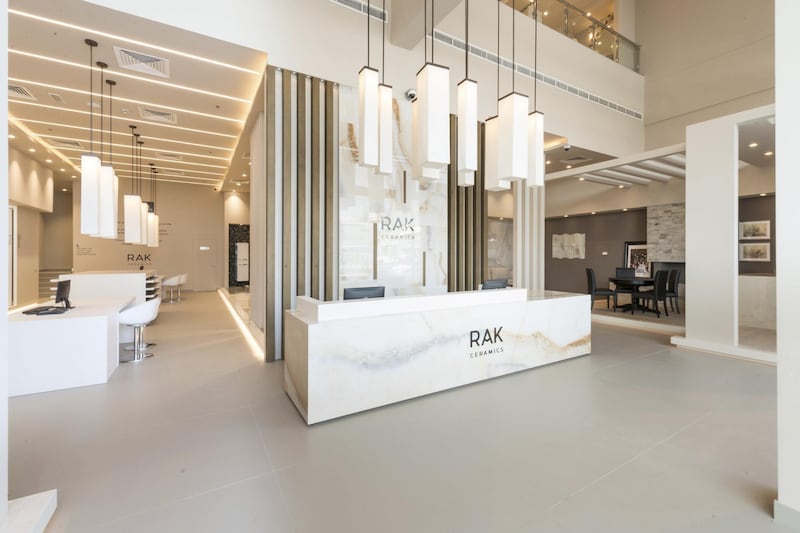RAK Ceramics, one of the world’s biggest makers of tiles and sanitary wares, is eyeing acquisition opportunities in the Arabian Gulf as it shifts from restructuring its business towards boosting growth.
The Abu Dhabi-listed company is also planning to complete its capacity expansion in India by the fourth quarter of this year, Abdallah Massaad, RAK Ceramics' chief executive, told The National. Operations in India are expected to be the biggest driver of growth in 2019 followed by the UAE, Saudi Arabia and Europe.
“Whenever there’s an opportunity for an acquisition or greenfield project we will for sure do it in the Gulf, we’re looking to increase our presence in the region,” Mr Massaad said in an interview on Monday, declining to provide a timeline or a value for potential investments. “Whenever we have something we will declare it.”
The Middle East recorded a 62 per cent increase in mergers and acquisitions deal values in the first half of the year compared to the same period in 2017, according to a July report from law firm Baker McKenzie. In the second half of 2018, the region is expected to see “promising” levels of M&A activity as governments in the Middle East implement economic reforms to attract investors.
The company has earmarked Dh300 million for capital expenditure in 2018, of which it has deployed Dh85m, leaving it with Dh215m for the remainder of the year, Mr Massaad said.
"We have not set a specific budget for acquisitions to increase our production capacity, but we are in a strong position to act should an opportunity present itself," he said.
RAK Ceramics began restructuring its business in 2014 when it announced plans to sell non-core businesses such as construction, property development and pharmaceuticals to focus on ceramics production.
"We have restructured, rebranded, shut down some businesses and increased capacity in the UAE, India and Bangladesh. Now we’re looking at growth and acquisitions,” he said. “In India, we acquired a factory and started a greenfield plant. The second focus market is the Gulf.”
The company is doubling its capacity in India after setting up its third plant in the country and will reach 18m square meters, adding another 5 to 7 per cent to the group's total capacity, he said.
___________
Read More:
[ RAK Ceramics says bullish on India, plans to acquire more operations ]
[ RAK Ceramics says third-quarter profit jumps more than fourfold ]
___________
“I have a lot of hope in India,” he said. “It’s a growing market and we feel it will give us big growth in 2019.”
The manufacturer is also planning to boost its market share in Saudi Arabia from its current 8 per cent share, depending on demand, he said, without providing details.
RAK Ceramics is not considering raising debt this year or restructuring any of its payments, Mr Massaad said.
The company, which serves more than 150 countries including Iran, is watching the situation following the US re-imposing sanctions on Tehran, he said. RAK Ceramics has two operational lines in the country working at 50 per cent capacity and with a "very low turnover" compared to the rest of the group.
“We’re monitoring it, we’re a UAE company and we follow the regulations of the UAE on this,” he said. “Iran’s revenue contribution to the top and bottom line is negligible, it's not material for us, so even if we shut it down, business won't change.”
A plant in China that was shut down in 2015 will be sold once a buyer is found, he said.
The company said on Monday its second-quarter net profit more than halved following a one-off gain in the same period last year and increased costs.
The company's net profit attributable to shareholders for the three months ended June 30, plummeted to Dh44.8 million, RAK Ceramics said in a statement to the Abu Dhabi bourse on Thursday, where its shares are traded. This fell below quarterly net profit estimate of Dh57.8m by EFG Hermes and Bahraini Sico's estimate of Dh48.7m. Revenues grew marginally to Dh719.2m in the second quarter from Dh721.1m a year ago.
RAK Ceramics flagged increased competition, oil and gas price volatility and geopolitical headwinds among the factors that may affect its business outlook in 2018.
Expectations of economic growth in its core markets, combined with high infrastructure budgets in the UAE and Saudi Arabia, are "positive trends" for growth this year, RAK Ceramics said.
The company is "cautiously optimistic about 2018," he said, declining to provide guidance on full-year earnings.
It has a network of operational hubs in Europe, Middle East and North Africa, Asia, North and South America and Australia. Its core markets are UAE, Saudi Arabia, India and Bangladesh.






